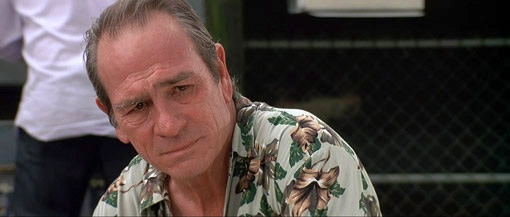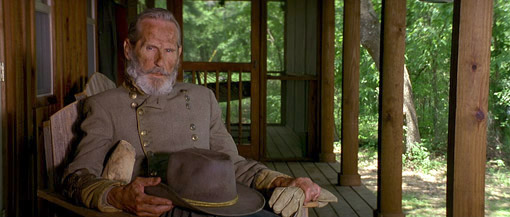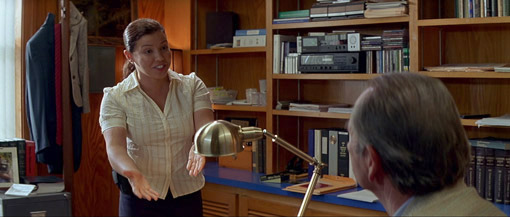"I think there's two ways of looking at the idea of understanding.
One is if you don't look you never will see. And the other is, if
you look a little less you'll understand a hell of a lot more." |
Dave Robicheaux |
There's a particular feel that films based on respected novels often have, or at least the good ones. It's not that original screenplays can't be complex or have layered plots or create characters with real depth, its just that as a medium the novel allows the author – and he or she really is the author here – a lot more flexibility on all of those fronts. Novels aren't expected to conform to expectations and type in the way that movies often are, and thus offer the writer close to complete freedom in how they wish to shape their stories and characters. They can also run for a lot longer and go into the sort of detail that a two-hour movie simply cannot afford. But when the film adaptation is true to the tone and feel of the novel as well as its content, remarkable things can happen. That's when you get the likes of There Will Be Blood, Ride With the Devil, or the sublime No Country for Old Men, films as rich and thematically complex as the stories from which they are drawn. Even if you've never read or even heard of the works from which they have been adapted, almost from the moment they begin you just know you're looking at a film of a novel. They have, if you'll excuse what must read like stating the bleeding obvious, a literary feel, something that extends beyond the plotting and dialogue and into the filmmaking itself.

In the Electric Mist is just such a film, announced up front by a title that could only have come from a novel, the full version of which is the even more beguiling In the Electric Mist with Confederate Dead. This is the sixth of a series of novels by Texas born author James Lee Burke built around the character of Dave Robicheaux, and to my sorry shame I've yet to read a single one of them. Having watched this second film adaptation of a Robicheaux story (the first was the 1996 Heaven's Prisoners, directed by Phil Joanou and starring Alec Baldwin) a total of three times now, I fully intend to plug that little hole in my education.
For those as inexperienced with the series as I, Dave Robicheaux (played here by Tommy Lee Jones – more on him later) is an ex-New Orleans homicide detective and recovering alcoholic who has returned to his Louisiana homeland and settled in the sleepy backwater town of New Iberia, where his continuing interest in crime investigation has landed him work as a detective for the local Sheriff's Department. By the sixth novel – the one adapted here – he has adopted a young daughter named Alafair (Alana Locke) and has married mobster widow and Lupus sufferer Bootsie (Mary Steenburgen). The story – this story – begins with the discovery of the mutilated body of a young woman in local woodland and a chance encounter with Hollywood superstar Elrod Sykes (Peter Sarsgaard), whom Robicheaux pulls over and arrests for drunk driving. Desperate to avoid being run in, Elrod reveals the location of decayed corpse discovered when he was filming in the bayou, a killing Robicheaux realises he may have witnessed as a child. Subsequent enquiries point him in the direction of local mobster Julius "Baby Feet" Balboni (John Goodman), a man with whom he was once good friends but now holds in contempt, and the subsequent investigation starts to suggest that the two temporally distanced killings may be somehow connected.
Although very different films, it's hard not to draw some comparisons with No Country for Old Men, in which Tommy Lee Jones also played a quietly spoken southern lawman. Both unfold at pace that feels partly shaped by the communities and landscapes in which they take place, and both are punctuated by sharp tonal gear shifts triggered by sudden and unexpected acts of violence. Unlike No Country, though, the story here revolves completely around its central character and is seen exclusively from his point of view – when he is drugged into unconsciousness, both he and we have to be filled in on what took place while he was out cold.* And where No Country's Sheriff Ed Tom Bell was weighed down by world-weariness, Robicheaux is quietly driven by a combination of curiosity, righteous indignation and genuine concern for his fellow citizens. He's a fascinating contradiction, a warm-hearted and progressive liberal with an old-school sense of violent justice that can explode from nowhere and be delivered with the swift efficiency of a Terminator on autopilot.
While the strengths of the storyline are doubtless drawn from the source novel, there's still a freshness in the film's almost offhand dismissal of genre clichés. A prime example is Rosie Gomez (Justina Machado), who as a visiting female Mexican FBI agent is almost a composite of everything a small southern police force are programmed to be hostile to, and yet from her first amusing encounter with Robicheaux (she's using his office and offers him a chair while she finishes her phone call), the two get along fine and work together as if they've been partners for years. It's a similar story when Robicheaux is framed for the death of a young prostitute, usually a trigger for self-doubt, suspicion and departmental distrust, but here it's quickly and categorically dismissed for the set-up it is. In being faithful to the novel the film takes its share of risks, particularly in the retention of Robicheaux's conversations with long dead Confederate General John Bell Hood, an initially drug-induced encounter that later almost skirts with the supernatural. And while the last act kidnap and manhunt hit a number of familiar touchstones, they conclude in a manner that is both sudden and unexpected, stripping the story of the climactic confrontation we've been led to believe it was building up to.

But it works. It really works. With no extra features to help us out here, we can only speculate on how acclaimed French director Bertrand Tavernier came to direct a Louisiana based police drama, but the decision was a shrewd one. Tavernier brings a character-driven European sensibility to the storytelling here, and an outsider's objectivity to a community that has too often functioned as a sinister background for visiting city folk to be terrorised by murderous locals. That there are bad and bigoted people here is not sidestepped, but they are shown to be the exception rather than the norm in a community that most would be happy to visit and even set up home in.
An expertly selected cast are uniformly impressive, with some fine work in support from Justina Machado, Kelly Macdonald (who plays Sykes' long-suffering actress girlfriend Kelly Drummond), Ned Beatty, Mary Steenburgen, Bernard Hocke and John Goodman. They're nicely supported by brief but memorable turns from Pruitt Taylor Vince as Robicheaux's overweight partner Lou Girard, Levon Helm as General John Bell Hood, and John Sayles (yes, that John Sayles) as mouthy movie director Michael Goldman, while Peter Sarsgaard convincingly underplays the key role of alcoholic movie star Elrod Sykes, a man Robicheaux unexpectedly connects to and takes under his wing.
But the rock around which the film rightly orbits is Tommy Lee Jones, who inhabits the role of Robicheaux so completely that I now now find it impossible to imagine him played by anyone else. An actor who can communicate more with a single look than a good many of his contemporaries can with their entire body, Jones has the face of a character actor but the charisma and screen presence of a leading man, and is one of the few actors whose every film I'd see just to watch him perform. My first exposure to his work was through his memorable supporting role in John Flynn's 1977 cult favourite Rolling Thunder, but it was his electrifying starring roles as billionaire industrialist Howard Hughes and condemned murderer Gary Gilmore in the Emmy Award-winning TV specials The Amazing Howard Hughes (1977) and The Executioner's Song (1982) that really put him on the map. In the years that followed he has repeatedly outshone the star names he's worked with, walking away with the feature version of The Fugitive, despite playing what was essentially a supporting role, and proving so essential to what made Men in Black work that his character had to be brought out of retirement and his wiped memory magically restored to get him into the sequel. And he's consistently excellent here, not in that eye-catching manner that wins big awards, but in his persuasive way with restraint, in what he doesn't openly express but can be seen simmering beneath the surface, exploding only under extreme provocation. Appropriately it's the little moments that really register, the exchange of looks with the local kid after he's disabled Baby Feet's car, his confused first encounter with General John Bell Hood, or the quick smile that's flashed (blink and you'll miss it) when Bootsie invites him to bed with an almost offhand "I'm horny."
It's quite likely that In the Electric Mist will have a hard time finding an audience in the UK, having received no cinema release here and almost crept out on DVD and Blu-ray. Its enigmatic title will mean nothing to those who do not know the book, and despite all I've said above, Tommy Lee Jones still doesn't have the star power to sell a film on his name alone, at least to a mainstream audience. The unsensational manner in which the story unfolds may also hamper good word of mouth, which would be a crying shame – it worked for No Country for Old Men and fully deserves to do so for its quieter but equally intelligent and engrossing cousin.
The opening shot of Robicheaux sitting in a bar contemplating his alcoholism is one that quietly demonstrates the pleasures of a prime HD transfer, one that copes effortlessly with the location's heavily coloured lighting and where the fine detail, particularly the metallic objects, subtly pops. You just know from this image alone that the film is going to look good, and it does. The spotless 2.35:1 picture does Bruno de Keyzer's atmospheric scope photography proud, boasting a consistently high level of detail, rich colour reproduction and a finely balanced contrast range, complete with inky blacks that do not sacrifice shadow detail in the night scenes.

The sound doesn't shine quite as brightly as the picture. It's not that there's anything wrong with the mix or the dynamic range – Marco Beltrami's fabulously moody score sounds great and there are some deep bass kicks from boat motors and the like – but we're only offered Dolby 2.0 stereo or Dolby 5.1 surround, with no sign of the uncompressed HD audio we've come to expect from Blu-ray releases. The low-key nature of the mix can make the levels on both are feel a little lower than many stereo and surround tracks, but when the loud noises come they still register. The use of the rears on the 5.1 is subtle but effective.
Not a thing. A crying shame, as there's plenty of scope here in the actors, the writer and director Tavernier, who provided a fine commentary on the DVD release of his 1992 police classic L.627.
It's taken me a long time to get my head round this review, in part because what makes In the Electric Mist such compelling cinema is actually quite hard to put into words, and I'm still not sure I've done it justice. Like the aforementioned Coen brothers Oscar winner, it gets slowly under your skin and grabs you more by stealth than full-frontal attack, aided by a terrific cast and the sort of filmmaking that delivers without drawing attention to itself. Some may struggle with the unforced pace, but if you are able to go with it then you're in for a treat. Great transfer, and while the lack of extras and HD soundtrack options disappoint a little, it still comes warmly recommended.
* This reflects the style of the Robicheaux novels, all of which are written in the first person from Robicheaux's viewpoint.
|